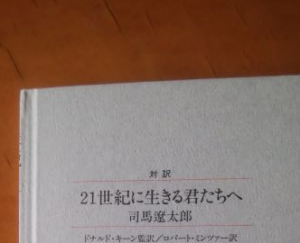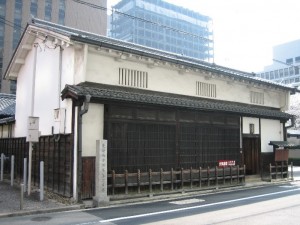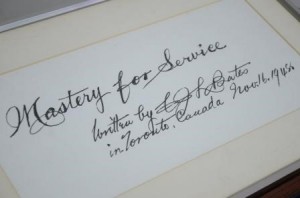2023年2月17日
E-News&Songs2月例会報告
リーダー 三浦 一男
I 議題の内容 The Torch of Koan
2月度は英字新聞の社説に代えて、司馬遼太郎著「21世紀に生きる君たちへ」と題する対訳本ドナルド・キーン監訳/ロバート・ミンツアー訳(朝日出版社)から、「The Torch of Koan」(洪庵のたいまつ)を選び、討議しました。
本は青少年向けに簡潔に蘭方医緒方洪庵(1810~1863)の生涯を描き同時に開いた適塾での教育について説明しています。その中で洪庵が医師としてのあり方をつきつめて(その後12の訓戒にまとめている)その生涯は医師として塾長としてそれらの実践であったことを述べています。適塾ではオランダ語や医療書籍のほか当時の西洋文明の書籍(科学、物理、政治、軍備)を集中的に自主的に学ばせました。この訓戒の実践も学ばせ、多方面の人材を幕末~明治にかけて輩出しました。福沢諭吉、大村益次郎などです。洪庵が偉大なのは、「自分の火を弟子たち一人一人に移し続けたことです。そして弟子たちのたいまつの火は、後にそれぞれの分野であかあかと輝いた」と言っています。
We selected and discussed in February session the short story written by Ryotaro Shiba, translation-supervised by Donald Keen, translated by Robert Minzer, “To You Who Will Live in the 21st Century”, instead of customary editorials by The Japan Times. The book we picked is written for young Japanese teenagers depicting the lifetime of Koan Ogata (1810-1863), the doctor of Dutch medicine. The book also describes about the private school named “Tekijuku” Koan opened. The book tells us: he wrote a set of admonitions, comprised from 12 clauses, as an exhortation to himself and his pupils. He applied the admonitions to his patients and pupils. He picked up textbooks not only on Dutch medicines but on science, physics, politics, military in Dutch language, and taught the students intensively with self-motivating manner. As a result, Tekijuku trained and dispatched famous activists for Meiji Restoration, for example, Yukichi Fukuzawa (Founder of Keio University), Masujiro Omura (Founder of the Japanese army). His greatness was his continuous passing on of his fire to each and every one of his students. The fire of his students’ torches later shined brightly in their respective realms.
II 討議のテーマ
討議のテーマは①各人自由に緒方洪庵のことについて調べて報告すること、②緒方洪庵の生き方を確認して、市井の人間として自分たちはどんな価値観、どんな姿勢で生活してきたかを話し合いました。最後に幕末の時代は現在の日本が直面している事態と似ていることから、③日本はこれから何をどのように改革するべきか自由討議をする予定でした。③については時間に余裕がなく、後刻メールでの意見交換がつづきました。
For discussion the leader presented three themes,
- Collect further information about Koan Ogata by yourself.
- Analyze Koan’s way of living and compare with what our own way of living as an ordinary person.
- Last days of Tokugawa Shogunate make us feel it resembles the appearance of present-day Japan in terms of various crisis. What should Japanese government deal with the hardship surrounding us?
(緒方洪庵の開いた適塾、大阪市中央区、阪大医学部発祥の地)
III 討議の結果
1.自由研究の結果の概要
Independent research as summary
各人は緒方洪庵を自由研究のごとくFact Finding して、本文では出てこないいろんな事実を報告しあい、緒方洪庵の理解を深めました。例えば、
① 蘭方医ではありましたが漢方も重視し、あくまで病気の治療を優先しました。晩年には英語が勃興してきましたが、柔軟に英語の勉強を勧めて、柔軟で合理的な姿勢を持ち続けました。華岡青洲一派とは塾生同士の対立が絶えなかったですが、洪庵は同じ医者仲間として接し患者を紹介し、医学上の意見を交換し合うなど懐の深いところがありまた。
②適塾出身者で有名な人達の経歴を調べ上げ、洪庵の貢献がいかに大きかったかを確認しました。そして、適塾はオランダ語と蘭方医の塾ではなく、本当に明治時代に必要な人材を育成する塾であるとわかりました。
③ 蘭方医としての強みはオランダ人が創った蘭日辞典を入手していたこと、あるオランダ人医師の50年の医師の診断実績を本にしたもの(30巻)を翻訳したことは、洪庵としてはその実践においてNo.1の地位を占める源泉でした。しかし、何よりも洪庵の医者としての本来の適性が極めてたかく、高い道徳観と柔軟な感覚で患者を治療したことが際立っていました。
④ 12の訓戒は英語で翻訳して改めて説明されました。じっくりと対訳して中味を味わいました。
⑤オランダ語は洪庵が将軍の侍医となった時点が最高潮で、幕府はオランダ語と蘭方を幕府の方針として認めましたが、以後英米両国の圧倒的な財力から軍事・貿易両面で急速に英語が主流となりました。しかし200余年の間西洋文明が日本に入ってきたのはオランダ語の書籍であり、唯一日本が西洋化に対処できたのは長崎開港以来のオランダ語書籍の流入であり、オランダ語を理解する人材が野にいたこと、さらに幕末では、洪庵の人材創出であったと言えます。
2.洪庵の市井人としての生き方を知って我々の生き方を顧みる
2番目の議題は、洪庵の生き方そのものは市井の人としてつつましく生きました。各人も一市井人として生きてきたわけであり、その生き方について率直な吐露があり、意見交換ができました。母校のモットーであるMastery for serviceの意義を再確認しました。
(ベーツ院長直筆:Mastery for Service)
Koan was not an eccentric person. He said in the book he was an extremely ordinary person of gentle character as you might find in any village or any town. We are also an ordinary person, and we have lived a gentle-likely- life. Every member told his way of living candidly, and shared way of living each other. We, Kwansei Gakuin Graduates have school motto “Mastery for Service”, and we discussed that as well and confirmed it as base upon our life.
3.「今後の日本の在り方」
今回は時間が不足したため会議後にメール交換をして討議を続けました。
一番大事な指摘は日本が戦後本当に誠実に対応してきたのか、正直、誠実、純粋、無垢、まっすぐな精神 ・・法治国家、民主主義を標榜する前に必要となるものです。もし、我々の未来を拓くことができるとするなら、それは国民全体のやる気と衆知に依らなければならないでしょう。そのためには国全体の正直さ、誠実さがまず求められると言っても言い過ぎではないかもしれません。
このことを前提に、日本のこれからのあるべき姿、政治形態、そのための大義名分は何かが必要です。これに対して具体的な構想や提案が一人のメンバーから提示されたことはさすがであり、今後もこうした思考作業を続けることが大事であると感じました。又その実現のための施策として初等教育の変革に取り組んでいるメンバーが居ることは心強いでした。
We discussed Japan’s future under the present situation of the world. We had little time for debating it. So we continued later by exchange of mails. Below is the summary.
The most important basic indication given by a member is:
“I attribute Japan’s decline to its dishonesty and insincerity.
I suppose men called ‘the ambitious’ at late Edo Period and men who achieved Meiji Restoration all lived through their lives believing in their ways with honesty and sincerity.”
We realized how important we should have vision for future of Japan and have great cause for justification with honesty and sincerity. Most impressive was that one member definitely depicted future Japan’s image and policies and how they should be practiced. We are proud that he already had thought deeply and dared to propose. We also felt proud and reassuring that one of the members now works on revolution of elementary education system in our country.







